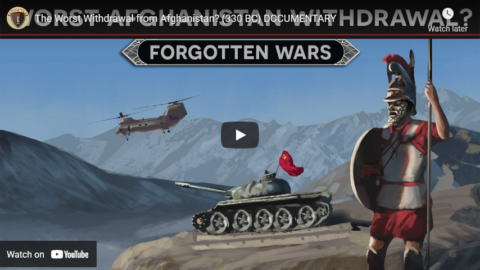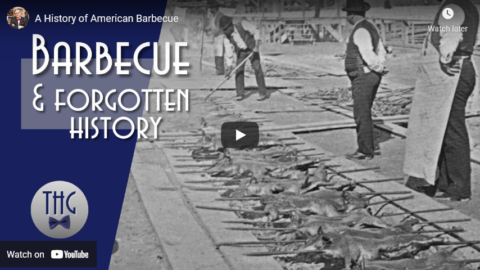Invicta
Published 28 Aug 2021Afghanistan has a long history of foreign invasions and withdrawals. Today we explore the first of these chapters with the campaigns of Alexander the Great. Signup for your FREE trial to Wondrium here: http://ow.ly/C3xs30rNLaU
As the last chapter of the US war in Afghanistan appears to draw to a close, the world watches armed and civilian forces alike conduct their final evacuations. However in these moments we hear echoes of the past. The history of the so-called “Graveyard of Empires” is filled with many chapters that tell of yet another major power that has been forced to withdraw after years of spilled blood and treasure. The most well-known instances have occurred in recent memory. However the pages of Afghan history go back thousands of years. Today I wanted to take a look at one of these first major military withdrawals that may just be the most FUBAR one on record; The evacuation of Alexander the Great’s Macedonian army from Afghanistan.
In order to contextualize this conflict we first begin with a quick overview of the history of Afghanistan. No country existed by that name or with those borders in antiquity and it was instead made up of a variety of tribal coalitions and minor kingdoms for much of its early history. However it would first see foreigners begin to claim its lands with the rise of the Median Empire and the succeeding Achaemenid Empire. The lands of modern Afghanistan would now be carved into a series of Satrapies such as Bactria, Gandara, Arakhosia, Drangaian, and Areia.
Following the Ionian Revolt and the Greco Persian Wars, the Kingdom of Macedon would rise to power and take on this ancestral conflict as a way to unify the Hellenic world behind its rule. Phillip II first began to plan and invasion of the Achaemenid Empire but it would be Alexander the Great who carried out this vision. He would campaign for several years through Anatolia, the Levant, Egypt, and Mesopotamia, consuming vast swaths of the enemy’s domains. However King Darius would escape to the east. Alexander initially pursued the Great King but when he was killed by his own Lieutenant, Bessus, Alexander set off against this traitor.
In this chase, Alexander the Great would be sucked into a multi-year war to subdue the eastern satrapies that made up modern Afghanistan. We cover the most significant events of this campaign, the establishment of occupying forces, and the eventual withdrawal of the army following the death of Alexander the Great. The ensuing settler revolt would make it (in my eyes) one of the most FUBAR Afghanistan withdrawals in history that would certainly be worthy of a Vice news documentary had it existed.
The Campaigns of Alexander the Great by Arrian
In the Footsteps of Alexander the Great by Michael Wood
Alexander the Great and Bactria: The Formation of a Greek Frontier in Central Asia by Frank Holt
The Greeks in Bactria and India by W. W. Tarn
On the revolt of the Greek settlers by DiodorusCredits:
Research: Invicta
Script: Invicta
Narration: Invicta
Artwork: Penta Limited#History
#Afghanistan
#Documentary
August 30, 2021
The Worst Withdrawal from Afghanistan? (330 BC)
Mark Steyn on chocolate soldiers, tutti-frutti generals, and the ice-cream commander-in-chief
When all that matters is not performance but performance art:
On the day that twelve US Marines and some 150 civilians were blown apart by suicide bombers, it was heartening to learn what real heroism is.
Until January 6th, the highlight of Michael Byrd’s “law-enforcement” career was leaving his loaded Glock in a congressional men’s room and paying no price. He “serves” with the grotesquely misnamed “Capitol Police”, which is not a police department but a praetorian guard – a personal security team for the praetors of Congress. Lieutenant Byrd shot and killed Ashli Babbitt, a 5’2″ unarmed woman, because “she was posing a threat to the US House of Representatives”.
All that has been known for months by anyone who wanted to know. The only real news in NBC’s Byrd exclusive was the level of his self-congratulation:
I believe I showed the utmost courage on January 6.
His interviewer, Lester Holt, did not respond: “Er, hang on, isn’t that the kind of thing you’re meant to leave for someone else to say about you?”
And did he have to say “utmost”? Even in as unutterably vulgar an age as ours, is even Michael Byrd incapable of imagining any “courage” greater than his own?
Ah, well, don’t over-think it; it’s just one of those phrases, half-remembered by Byrd from some Rose Garden medal ceremony he caught on TV: “utmost” goes with “courage” like “white” goes with “supremacist” and “domestic” goes with “terrorist”.
America is a land that tends to the utmost in all things. At the end of the nineteenth century, Bernard Shaw popularized the term “chocolate soldier” — the dashing hussar who is useless in battle but looks good in a uniform. We have the tutti-frutti generals: Thoroughly Modern Milley and his chums, whose diversity ribbons from shoulder to scrotum advertise their own utmostness even as they explain why everything going wrong merely demonstrates how everything is going right.
The tutti-frutti generals report to the ice-cream commander-in-chief melting all over the lectern every afternoon. His predecessor was on telly all day every day; Mr Biden was sold to head-in-the-sand Americans as the quiet-life guy who wouldn’t be in your face. Unfortunately, when your countrymen get blown up by government blunders, the citizenry expects him to be in their faces at least every now and then. Across the Atlantic, Boris and the EU chaps were on the screen responding to an all too predictable atrocity. But in the White House Joe Biden’s meds hadn’t yet kicked in — or, conversely, they’d shot him the juice too early and it had worn off. So, as has become familiar, the melting waffle cone was hours late in tottering across the room, squinting into the camera and reading with woozy and wooden defiance. This time he gave it the full Corn Pop:
To those who carried out this attack, as well as anyone who wishes America harm, know this: We will not forgive. We will not forget.
But Joe, a man who cannot reliably name his own Defense Secretary, has already forgotten.
A History of American Barbecue
The History Guy: History Deserves to Be Remembered
Published 29 Jun 2020Different cultures have been roasting meat over a fire since prehistory, but the practice took on special meaning in the United States. The History Guy remembers a brief history of American barbecue.
This is original content based on research by The History Guy. Images in the Public Domain are carefully selected and provide illustration. As very few images of the actual event are available in the Public Domain, images of similar objects and events are used for illustration.
You can purchase the bow tie worn in this episode at The Tie Bar:
https://www.thetiebar.com/?utm_campai…All events are portrayed in historical context and for educational purposes. No images or content are primarily intended to shock and disgust. Those who do not learn from history are doomed to repeat it. Non censuram.
Find The History Guy at:
Patreon: https://www.patreon.com/TheHistoryGuy
Join the History Guy for history trivia at https://www.quizando.com/TheHistoryGuyThe History Guy: History Deserves to Be Remembered is the place to find short snippets of forgotten history from five to fifteen minutes long. If you like history too, this is the channel for you.
Awesome The History Guy merchandise is available at:
teespring.com/stores/the-history-guyScript by THG
#ushistory #thehistoryguy #foodhistory
QotD: “Veneer theory” of human nature
Before the Blitz the consensus was that a little light bombing was all it took to make the wheels come off civilisation. This is based on veneer theory — our good behaviour is a thin veneer laid on our fundamentally selfish, violent nature, and that under pressure our true nature will out.
This turned out not to be true. So spectacularly untrue that we still talk about the Blitz Spirit. With our trademark humility, the British concluded that this was due to our exceptional moral fibre and, with help from the Americans, set about bombing German civilians to hell and back. Regrettably the Germans too responded by pulling together, and working harder in the war effort. Literally no one thinks this was due to their exceptional moral fibre. Instead, it seemed that crisis led to teamwork. Bregman is able to quote similar behaviour on the Titanic, on September 11th and in the aftermath of Hurricane Katrina.
Despite this mountain of evidence, veneer theory is still overwhelmingly believed. In 1951 William Golding wrote Lord of the Flies — a book about how a group of British boys crash-landed on a Pacific island would really behave. They start with ideals of co-operation, but quickly descend to violence and anarchy. Weeks later when they’re rescued half of them are dead. The book became a massive best seller, and a much-studied classic. For those who lived through World War I, World War II, and were now watching communism demonstrate that you didn’t even need an enemy to slaughter tens of millions, you can see the appeal of a cynical view of human nature. However it is pure fiction. In 1966 Lord of the Flies happened for real — 6 teenagers went for a joy ride in a fishing boat, got swept out by a storm and washed up on an inhospitable island in the Pacific. When they were found 11 months later, they were all alive and healthy. They had survived by fortitude, resourcefulness and above all, teamwork.
An anonymous reviewer, “Your Book Review: Humankind”, Astral Codex Ten, 2021-05-28.






